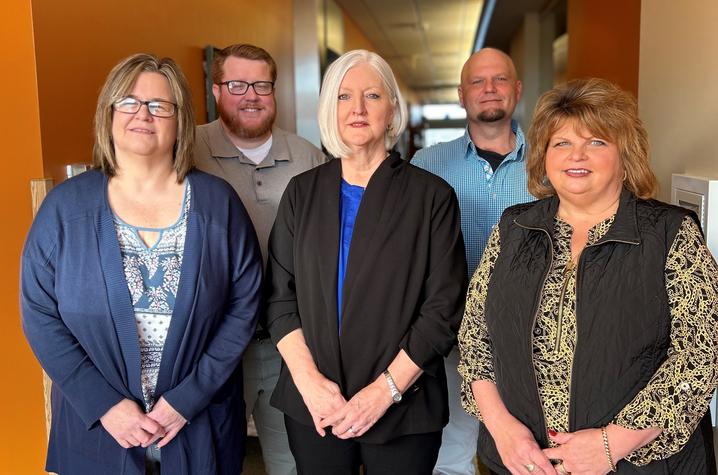UK Center of Excellence in Rural Health receives grant to increase number of community health workers

HAZARD, Ky. (March 31, 2023) — The University of Kentucky Center of Excellence in Rural Health (CERH) will launch ELEVATE CHWs, a new program to increase the number of community health workers (CHW) in Kentucky by providing training for new community health workers and offering upskill training for existing ones. The center received nearly $2.6 million in grant funding from the Health Resources and Services Administration (HRSA), an agency of the U.S. Department of Health and Human Services.
ELEVATE (Educate, Lead, Empower, Value, Access, Train, and Equity) CHWs provides two training tracts. One is for existing community health workers who want to gain advanced training in special areas like behavioral health, disabilities or emergency preparedness. The other is geared toward adults and high school students who want to earn their initial CHW certification. Students have the opportunity to earn dual high school and college credits for completing initial community health worker training, followed by an apprenticeship.
The UK CERH earned official status as a Kentucky Apprenticeship site from the Commonwealth of Kentucky in 2022 in advance of receiving ELEVATE funding. In addition to serving as an apprenticeship site the UK CERH will also be an intermediary for other agencies wanting a community health worker apprentice.
“Through apprenticeship placements, we will bring new community health workers into the workforce and ensure they receive the trainings and skills needed to be successful in their careers. As an intermediary we will assist other agencies in securing and growing their CHW workforce and accessing resources for potential funding opportunities, tax credits and other incentives,” said UK CERH Research Interdisciplinary Director Melissa Slone, D.S.W.
“Health disparities and health care workforce shortages have been longstanding issues in Kentucky, especially in rural and underserved communities,” said UK CERH Director Fran Feltner, D.N.P. “These issues, combined with the pandemic and recent natural disasters, have further emphasized the vulnerability of underserved populations when facing extreme circumstances. However, these same circumstances have also brought to light the important role community health workers have in community outreach, prevention education, and connecting individuals to care and support services.”
Community health workers have been recognized for their ability to complement health care services by filling in critical gaps to help people achieve better health and behavioral health. With their extensive knowledge of community resources, community health workers are uniquely positioned to support clients in addressing personal challenges related to social determinants of health such as food and housing insecurities. They are skilled in tackling barriers to health care access and often have special training to empower clients with the knowledge and skills to better manage their own health, in particular individuals impacted by chronic disease.
As part of the ELEVATE CHWs program, an HRSA Region 4 Community Health Worker Advisory Workgroup will be created. This region encompasses Alabama, Florida, Georgia, Kentucky, Mississippi, North Carolina, South Carolina and Tennessee. The advisory workgroup will collaborate to review, compare and define the roles of community health workers and identify the skills needed to create a workforce prepared to address health disparities and poised to provide intervention to assist vulnerable populations in times of crisis. This workgroup will also educate and advocate for community health workers to become integral members of the health care workforce team, even if they are employed outside health care settings by keeping the community in community health workers.
“We are excited and thankful for this opportunity to move the community health worker workforce forward in Kentucky,” said Feltner. “We believe the ELEVATE program will improve access to care, strengthen the public health workforce, tackle health disparities and help underserved populations achieve health equity.”
Feltner recognized the many partners that will be instrumental in the success of ELEVATE, including Kentucky Homeplace, the longest-standing community health worker program in Kentucky. The Kentucky Homeplace training curriculum will be utilized during ELEVATE and will be taught be Kentucky Homeplace personnel with extensive experience in the field. Feltner added there are many partners both locally and throughout Kentucky that are supporting this initiative. See a complete list of partners and learn more about ELEVATE here, contact Kyle Burnett, at kyle.burnett@uky.edu.
About the UK Center of Excellence in Rural Health
The University of Kentucky Center of Excellence in Rural Health was established by state legislation in 1990 to address health disparities in rural Kentucky and the unique challenges faced by our communities. The mission was and still is today to improve the health and well-being of rural Kentuckians. For more than three decades, the center has partnered with communities, providers, students and individuals to provide health professions education, health policy research, health care service and community engagement toward reaching this mission.
This project is supported by the Health Resources and Services Administration (HRSA) of the U.S. Department of Health and Human Services (HHS) as part of an award totaling $2.6 million with 0 percentage financed with non-governmental sources. The contents are those of the author(s) and do not necessarily represent the official views of, nor an endorsement, by HRSA, HHS, or the U.S. Government. For more information, please visit HRSA.gov.
As the state’s flagship, land-grant institution, the University of Kentucky exists to advance the Commonwealth. We do that by preparing the next generation of leaders — placing students at the heart of everything we do — and transforming the lives of Kentuckians through education, research and creative work, service and health care. We pride ourselves on being a catalyst for breakthroughs and a force for healing, a place where ingenuity unfolds. It's all made possible by our people — visionaries, disruptors and pioneers — who make up 200 academic programs, a $476.5 million research and development enterprise and a world-class medical center, all on one campus.




